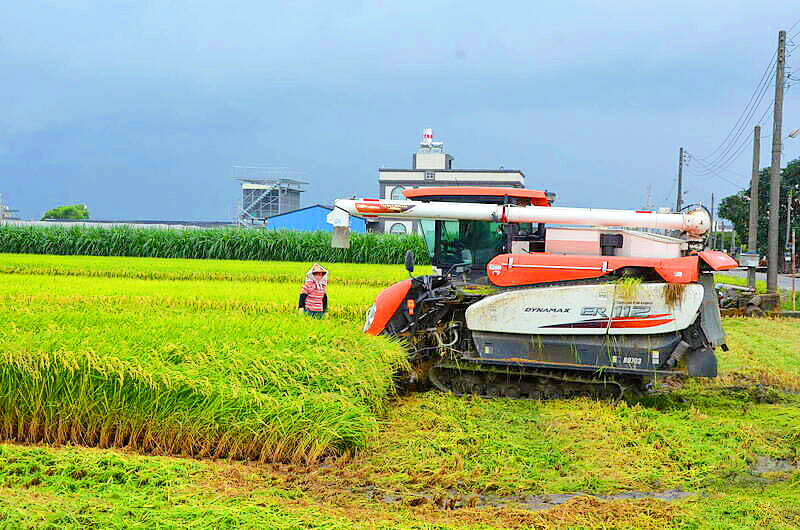As Taiwan enters the fourth round of tariff negotiations with the US, domestic farming groups issued a joint statement yesterday warning that importing cheap US rice under a zero-tariff arrangement would flood the market and cause irreversible harm to Taiwan’s rice industry.
The statement also called for reforms to the public grain purchasing system, advocating for a shift from a focus solely on quantity to a tiered pricing model that prioritizes quality.
Countries that have secured relatively low tariffs from the US, such as the UK, Japan, Vietnam and the Philippines, have fully opened their markets to US agricultural products.

Photo: Taipei Times
In contrast, South Korea has not agreed to import US rice and other agricultural products without restrictions, and its tariff rate is at 25 percent.
As the negotiating team, led by Vice Premier Cheng Li-chiun (鄭麗君), enters its fourth round of trade talks with Washington, President William Lai (賴清德) on Wednesday said that the aim is to protect Taiwan’s national interests, domestic industries, public health and food security.
While other countries with low tariffs have opened their markets to US agricultural products, domestic farmers’ groups expressed concern over the negative impact that would have on the local agricultural industry.
Citing Japan’s experience, where the opening of its rice market severely affected local farmers, the groups said that rice should remain a non-negotiable red line in negotiations with the US.
They said that the mass importation of cheap US rice would devastate Taiwan’s domestic rice industry, contribute to rural decline and collapse the food system, leading to an irreversible disaster.
The groups also outlined the challenges faced by the industry, saying that Taiwan is the only country globally to maintain a public rice purchasing system, where the government buys rice at a fixed price regardless of quality.
This system has reached its price ceiling and does not incentivize high-quality rice production, discouraging farmers from growing premium rice, they said.
Instead of focusing solely on quantity, the system should be reformed to reward rice quality through a tiered pricing structure, offering farmers higher returns for producing high-quality rice, they said.
This would also reduce the use of fertilizers and pesticides to better protect Taiwan’s environment, they added.
Taiwan should continue expanding its rice processing efforts, including producing rice flour to replace imported wheat flour and utilizing rice in brewing, which would increase the added value of Taiwan’s rice and open up markets, they said.
The statement called on the Democratic Progressive Party-led administration to stand firm on rice as a red line in trade talks, saying that rice is a strategic crop and not a bargaining chip.
It also urged reforms to the public rice purchasing system, advocating for the introduction of tiered pricing and quality incentives, while strengthening regional contract models to assist farmers with production, processing and marketing, thereby enhancing the resilience and value of Taiwan’s rice industry.
Farmers’ markets and groups supporting the statement include Hope Market, Water Garden Organic Farmers’ Market, East City Farmers’ Market, Tri-Small Market, the Taiwan Organic Food and Agricultural Education Association, the Taiwan Green Market Association, Wan Yao Market, Hualien Farmers’ Market, Exploring Flavors of Eastern Taiwan and the Taiwan Good Rice Circle Association.

US President Donald Trump said "it’s up to" Chinese President Xi Jinping (習近平) what China does on Taiwan, but that he would be "very unhappy" with a change in the "status quo," the New York Times said in an interview published yesterday. Xi "considers it to be a part of China, and that’s up to him what he’s going to be doing," Trump told the newspaper on Wednesday. "But I’ve expressed to him that I would be very unhappy if he did that, and I don’t think he’ll do that," he added. "I hope he doesn’t do that." Trump made the comments in

Tourism in Kenting fell to a historic low for the second consecutive year last year, impacting hotels and other local businesses that rely on a steady stream of domestic tourists, the latest data showed. A total of 2.139 million tourists visited Kenting last year, down slightly from 2.14 million in 2024, the data showed. The number of tourists who visited the national park on the Hengchun Peninsula peaked in 2015 at 8.37 million people. That number has been below 2.2 million for two years, although there was a spike in October last year due to multiple long weekends. The occupancy rate for hotels

A cold surge advisory was today issued for 18 cities and counties across Taiwan, with temperatures of below 10°C forecast during the day and into tonight, the Central Weather Administration (CWA) said. New Taipei City, Taipei, Taoyuan and Hsinchu, Miaoli and Yilan counties are expected to experience sustained temperatures of 10°C or lower, the CWA said. Temperatures are likely to temporarily drop below 10°C in most other areas, except Taitung, Pingtung, Penghu and Lienchiang (Matsu) counties, CWA data showed. The cold weather is being caused by a strong continental cold air mass, combined with radiative cooling, a process in which heat escapes from

Snow this morning fell on Alishan for the first time in seven years, as a strong continental cold air mass sent temperatures plunging across Taiwan, the Central Weather Administration (CWA) said. The Alishan weather station, located at an elevation of about 2,200m in central Taiwan, recorded snowfall from 8:55am to 9:15am, when the temperature dropped to about 1°C, the CWA said. With increased moisture and low temperatures in the high-altitude Alishan area, the conditions were favorable for snow, CWA forecaster Tsai Yi-chi (蔡伊其) said. The last time snow fell at the Alishan weather station was on Jan. 10, 2018, while graupel fell there